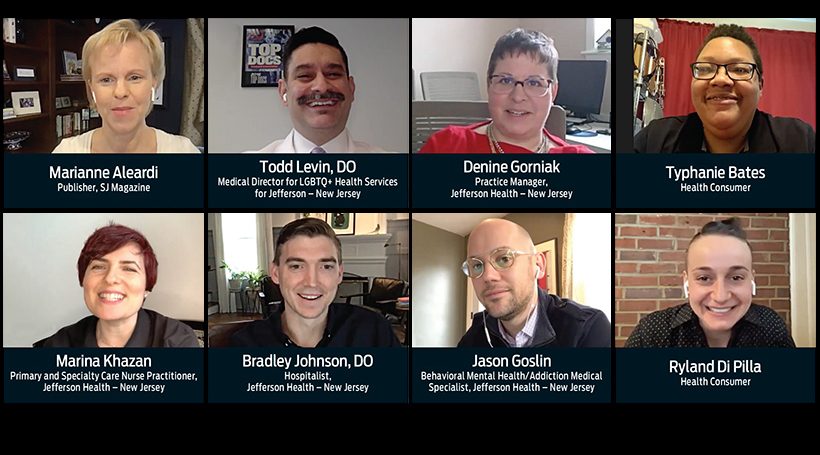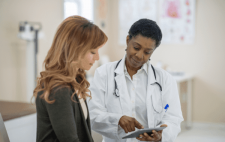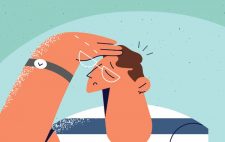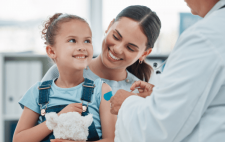Presented by

Jefferson Health – New Jersey took a major step this year with the opening of a health center for the LGBTQ+ community. The first of its kind in South Jersey, the center provides a place that is safe and positive for a community that often feels they have few resources and little support. We asked providers and patients from Jefferson’s new center to join us for a discussion about the many reasons for the center, and the good they believe their work will bring to South Jersey.
Participants:
Marianne Aleardi, Publisher, SJ Magazine
Todd Levin, DO, Medical Director for LGBTQ+ Health Services for Jefferson – New Jersey
Denine Gorniak, Practice Manager, Jefferson Health – New Jersey
Typhanie Bates, Health Consumer
Marina Khazan, Primary and Specialty Care Nurse Practitioner, Jefferson Health – New Jersey
Bradley Johnson, DO, Hospitalist, Jefferson Health – New Jersey
Jason Goslin, Behavioral Mental Health/Addiction Medical Specialist, Jefferson Health – New Jersey
Ryland Di Pilla, Health Consumer
On the need for the LGBTQ+ health center
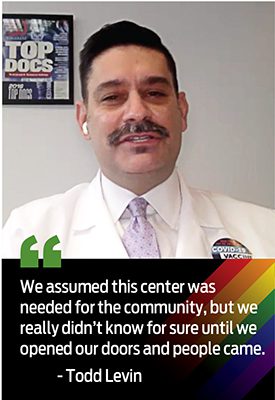 In the past, patients would have to go to Philadelphia, Asbury Park, New York City or Baltimore for LGBTQ+ affirming healthcare. Now we have it right here, and we’re working on forming networks to refer patients to our practice and to find specialists who are adept at taking care of our community.
In the past, patients would have to go to Philadelphia, Asbury Park, New York City or Baltimore for LGBTQ+ affirming healthcare. Now we have it right here, and we’re working on forming networks to refer patients to our practice and to find specialists who are adept at taking care of our community.
Todd Levin
I’ve not had good experiences with doctors. I avoided them because I didn’t feel comfortable sharing myself with them. But then I happened to come across an article about this location and all of a sudden I was like, I could do this. All of a sudden I had hope.
Ryland Di Pilla
I wasn’t comfortable at the practice where I used to go. Just being able to be comfortable to talk about anything and everything with my provider here has been life-changing.
Typhanie Bates
On what the LGBTQ+ center provides
We have primary care providers for basic well visits and care, infectious disease doctors, behavioral health therapists and medication-assisted therapy. We work with patients who are working through substance abuse issues. We have infectious disease doctors, and we’re actively seeking out providers in the Jefferson network to be collaborative or referring physicians, including OB-GYN doctors. That’s a big issue for the community.
Denine Gorniak
We also have the availability of telehealth, so we can see flu and Covid patients.
Todd Levin
On bias in the medical community
If my patients are interested in getting gender-affirming surgery, the fear we have is, a week or 2 later in a follow-up visit, a patient will come back and say, “I didn’t get it because I went in and I wasn’t comfortable or the provider wasn’t receptive.”
Bradley Johnson
Having staff and medical providers who are experienced asking the right questions can make a difference in creating an environment for a patient to open up.
Jason Goslin
In one of my not-great doctor experiences, I told the doctor about my history of anxiety and how I wanted to go on medication and get help. I got turned down. And it’s like, if you only knew how long I’ve been in the closet and all of the struggle I’ve been through.
Ryland Di Pilla
A lot of these biases are unrealized or implicit. You don’t realize that you have them, and that makes it even harder to learn about them and overcome them. So I think we still have a long way to go, but we’re getting there.
Todd Levin
On AIDS
AIDS is still around, but fortunately it’s not the death sentence it was in the ’80s and ’90s, and we’re getting really good at treating it. It’s a great story that people aren’t dying from it anymore, as long as they take their medicine.
Todd Levin
On helping family accept change
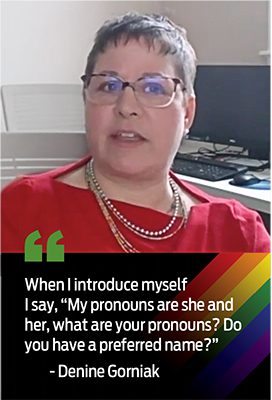 For the parent who’s struggling with accepting their child, they need to process their grief and the struggle of learning to accept this new normal. There’s an even bigger piece for the parent when they’re learning to understand their trans child. And it goes beyond just having a new name and pronoun.
For the parent who’s struggling with accepting their child, they need to process their grief and the struggle of learning to accept this new normal. There’s an even bigger piece for the parent when they’re learning to understand their trans child. And it goes beyond just having a new name and pronoun.
Denine Gorniak
It’s hard for family because they have a certain view of you as soon as you’re in the womb. They have an idea of what your life is going to be like, and when it’s not that, that’s hard. My parents have been doing everything to find resources and to talk to people, other parents, support groups and things like that. That has made it a lot easier for them.
Ryland Di Pilla
On working in this field
In my early professional life I was told to stay in the closet. It felt very nerve-racking. I thought I was the only one and weird. I thought people were going to say something or I’d face discrimination at work, so I just kind of kept to myself. Now, in this practice, I feel like I can actually understand our patients and be there for them.
Marina Khazan
I didn’t come out until I was 30, so all my 20’s were in school, medical school, residency, fellowship – working on the go. Then finally I needed to figure out what makes me happy, and I did, and was able to come out to friends and family, which was great. Since then I’ve been able to work more with the communities I want to give back to, and certainly the LGBTQ+ community is one of those because there’s so much need.
Todd Levin
I’m at the front desk and I see patients after they see their Jefferson providers. They’re so relieved and happy, and sometimes there are tears of joy. It’s really rewarding to be a part of that and to know we are making a difference.
Denine Gorniak
I came out when I was in my mid-to late-20’s. Like most folks, it’s like navigating this internal conflict of what is right or what’s true or how is this going to change things. Having gone through this has certainly influenced how I approach patients and emphasized my need to really be a support for people to work through those internal conflicts, whatever they may be.
Jason Goslin
On mental health issues
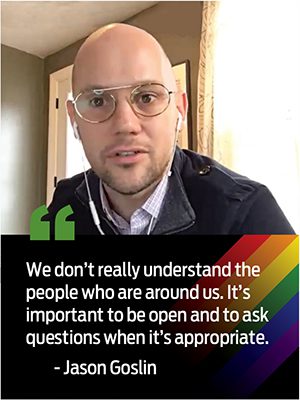 Say if you had somebody come out as a teenager or they’re questioning, and their family is not accepting, or even worse, if they’re opposed to it – that can be very damaging. So we certainly see mental health conditions at a higher rate within the LGBTQ+ community as well as higher incidence of things like post-traumatic stress.
Say if you had somebody come out as a teenager or they’re questioning, and their family is not accepting, or even worse, if they’re opposed to it – that can be very damaging. So we certainly see mental health conditions at a higher rate within the LGBTQ+ community as well as higher incidence of things like post-traumatic stress.
Jason Goslin
A lot of times we don’t know why we feel the way we do, but we know there are problem areas. There are things that are unresolved or experiences we’ve had, whether recently or in our distant past, that really inform how we think about ourselves and how we think about the world around us.
Jason Goslin
In the Black community specifically, we don’t talk a lot about mental health. To be comfortable in a practice and to be able to open up about anxiety is really important because, as far as your mental state goes, it can lead to some physical issues.
Typhanie Bates
On coming out to your healthcare provider
Being honest and having a relationship with your patient is the most important thing. The key is being comfortable enough to be yourself with your provider and, whether you are ready to come out or not, it’s really a personal journey.
Bradley Johnson
We can take care of you best when you’re telling us all the information, whatever it is. There’s no judgment involved.
Todd Levin
When I’m talking to the patient, sometimes I start having a casual conversation and not delving into personal questions immediately. And then I slowly peel, layer by layer, to eventually discuss their sexual practices and ask other questions that need to be tailored to our community.
Marina Khazan
On being misidentified
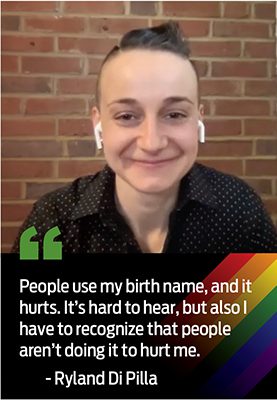 I’ve noticed, especially being trans, that people are so worried about saying the wrong thing that they put their foot in their mouth. I don’t get offended. But if you want to learn, listen to our stories. A lot of us have stories to tell, and it’s therapy for us, too.
I’ve noticed, especially being trans, that people are so worried about saying the wrong thing that they put their foot in their mouth. I don’t get offended. But if you want to learn, listen to our stories. A lot of us have stories to tell, and it’s therapy for us, too.
Ryland Di Pilla
Assumptions that, because someone is married their spouse is a specific gender, can be really damaging. Assumptions can create a lot of anxiety but also perpetuate the person’s feelings of isolation, self-hatred and internal conflict.
Jason Goslin
I certainly have misgendered people before and I just say “I’m sorry, I didn’t mean anything by it, but I know now.” That goes a long way and you can move forward with that.
Todd Levin
Maybe this is controversial to say but it’s also up to us to have some grace with the people who aren’t in our community. A lot of them are trying to be understanding. I could be the first person they’ve ever met who is part of this community, so how do I want to represent it? Do I want to show my patience and understanding so that they can see us in a good light? Or do I get offended and get angry with them?
Ryland Di Pilla
On finding community
When I talk to people who hint around that they’re in any way non-heterosexual, that’s something I focus in on. I want them to know it’s okay. Not only is it okay, but I’m here for you, and there’s an entire community to support you.
Typhanie Bates
I wish I knew somebody who was trans or gay when I was younger. I would have figured everything out sooner.
Ryland Di Pilla
When I came out in the ’80s, the only person who made you feel you’re not quite alone was Boy George, who wouldn’t even admit who they were, truly. And we had Annie Lennox, who was probably a big fashion influence for me because she was androgenous and I could rock the short hair. That was it. So I was in the closet for a long time. When I came out, it was hell. But I’m a pretty fortunate person that while I’ve had my share of bullying, it was never so traumatic that it kept me from living my authentic life.
Denine Gorniak
On the effects of the pandemic
The isolation has really impacted a lot of folks because they don’t have connection to their community. They may be in a household that’s not accepting or where they feel they don’t have the ability to communicate who they are and how they feel. So they feel trapped.
Jason Goslin
I didn’t realize how triggering the pandemic was for me until I watched a program about the AIDS crisis and I realized how much this parallels the loss I witnessed as a young person in the ’80s. There’s the death toll, the depression, the stress, the fear of being judged because you’re doing something socially.
Denine Gorniak


